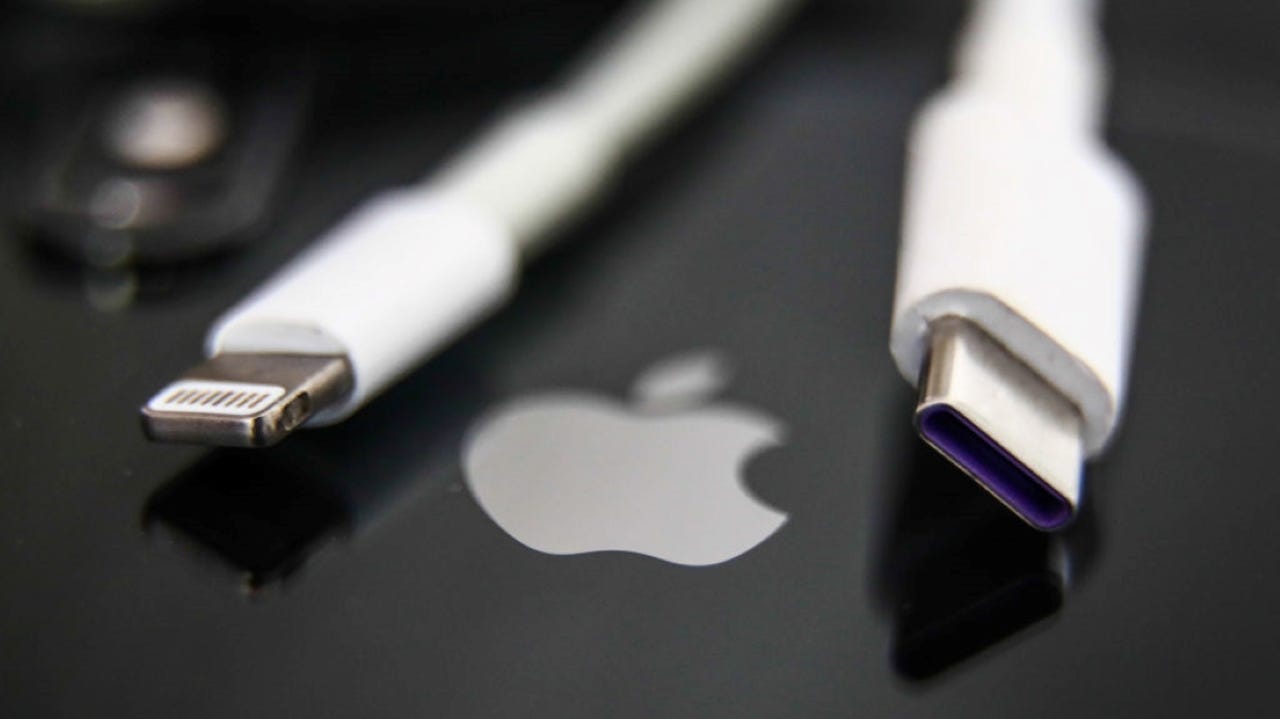
































The days of the Lightning cable are numbered.
Getty ImagesThis year's iPhone 15 unveiling event will mark the beginning of the end of the Lightning connector, as Apple has its hand forced by the European Union lawmakers to shift to the USB-C standard.
The Lightning connector has had a good run, first introduced with the iPhone 5 back in September 2012, which, itself, was a follow-on from the 30-pin connector that had been fitted to Apple devices since the release of the 3rd-gen iPod Classic in 2003.
Also: The iPhone 15's USB-C upgrade is more game-changing than you think. Here's why
But switching to USB-C is a big change. A huge change. There are almost 1.5 billion iPhones currently in use, all of which have Lightning ports. And every owner has at least one charging cable and charger -- usually a lot more -- and countless gadgets that plug into or otherwise interface with the iPhone.
That's a lot of stuff.
Before I go on to the practicalities of what this change means for iPhone users, let me answer a question that I've been getting a lot recently -- how long will iPhones have USB-C before Apple changes it again?
Well, chatter has been that Apple wanted to stick with the Lightning port until it was ready to shift the iPhone over entirely to wireless. It's unclear what this roadmap is, but if Apple is going to adopt USB-C, then it's clear that this plan isn't yet ready to roll.
Also: Why some people are buying MacBook Pros with broken displays
Will USB-C have a decade on the iPhone? Who knows (outside of high-level Apple executives), but I wouldn't be surprised if we don't see Apple start to mention that wireless is the future. But if Apple starts selling cables and gadgets to leverage that USB-C port, then I'd expect USB-C to hang about for a few years.
After all, every port switch that Apple has done has experienced some sort of pushback from consumers and bad press. It's change, and some people don't like change.
Okay, enough about the future. You own an iPhone, and you're planning an upgrade to the iPhone 15. What does this mean to you?
First off, your Lightning cables are now history. There may be a Lightning to USB-C dongle that Apple will sell -- more on this in a minute -- but I don't think it will make more sense to convert old cables.
Also: Buying a USB-C charger for iPhone 15? Anker's Nano series has all the options
Just buy someUSB-C cables . After all, you'll now have one cable that'll work for your iPhone, iPad, Mac, and billions of other devices out there.
As for chargers, if you have a USB-C charger, then you're good to go. It doesn't matter what it is, it'll work. It might not be the fastest at charging, but it'll be compatible.
We don't know what the charging speeds of the new iPhone 15 will be yet, but if you have something like a30W USB-C charger , then that's likely to be about as powerful a charger as you need.
If you're usingMagSafe wireless charging , then you're already living in the future, and you're good to go.
Before USB-C, MagSafe charging was the latest change in how iPhones could power up.
Jason Hiner/What about wired CarPlay? Cars are fitted with a USB-A port. It's why a lot of people still have USB-A-to-Lightning cables even if everywhere else they've made the shift to USB-C. We don't have any details yet, but I'd bet money that a USB-A to USB-C cable will work, or Apple will almost certainly have a dongle that it'll sell to customers.
See, while the change to USB-C was foisted on Apple, not only will the company make it seem like a great idea, but it'll also capitalize on it to sell more stuff.
Also: iPhone MagSafe-style wireless charging could be coming to your Android phone. Here's why
What about the myriad of things out there that already hook up to iPhones? Everything from docks to thermal cameras. Anything and everything that has a Lightning connector.
Well, you're going to need that dongle again. Maybe get a few of them so you've always got one handy. Or, if dongle life feels like too much of a hassle for you, you'll need to buy new things.
It's a change for sure, but with close to one and a half billion devices out there with Lightning ports, it's going to be a while before they're completely gone. In fact, I still see the odd iPod that has a 30-pin connector still in use. And nowadays, there are a lot more devices with Lightning ports than there were iPhones and iPods with 30-pin connectors back in the day.
Also: My favorite USB-C accessory of all time scores a magnetic upgrade
So, yes, it's change, but don't panic, because all your problems can be solved by giving Apple some more money.
You might need to replace a cable or two, and perhaps buy a few dongles, but other than that, it's not going to be a big deal. And remember, rather than throw those old cables into the trash, be a hero, save the planet, and pass them on to someone with an older iPhone.
 Etiquetas calientes:
tecnología
Nuestro proceso
Los teléfonos inteligentes
IPhone iPhone
Etiquetas calientes:
tecnología
Nuestro proceso
Los teléfonos inteligentes
IPhone iPhone